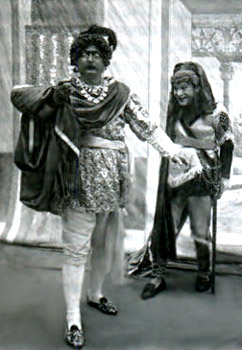 Aparesh Chandra Mukhopadhyay was an actor, playwright, and producer in the field of Bengali theatre. It can be said that he filled the vacuum in Bengali theatre between the death of Amarendra nath Dutta and the emergence of Sisir Bhaduri. Initiated in the art of acting by Manindra Gupta, proprietor of Pandora Theatre on the Vina stage, he held other jobs till 1904. Manomohan Pande brought Aparesh Chandra Mukhopadhyay to theatre permanently as benefactor. He was there to perform as a hired artist for various private companies.
Aparesh Chandra Mukhopadhyay was an actor, playwright, and producer in the field of Bengali theatre. It can be said that he filled the vacuum in Bengali theatre between the death of Amarendra nath Dutta and the emergence of Sisir Bhaduri. Initiated in the art of acting by Manindra Gupta, proprietor of Pandora Theatre on the Vina stage, he held other jobs till 1904. Manomohan Pande brought Aparesh Chandra Mukhopadhyay to theatre permanently as benefactor. He was there to perform as a hired artist for various private companies.
One such association with the Elysium Theatre in Narail, East Bengal, brought him in close contact with Ardhendu Sekhar Mustafi. This was cemented at the Manomohan or Minerva Theatre where Mukhopadhyay became the manager in 1904. Here he developed a relationship with the actress Tara Sundari, whom he married secretly. Girish Ghosh also joined the theatre, but Ghosh`s favouritism toward his son Surendra in allotting roles forced Mukhopadhyay to leave. In 1906, he joined the Star Theatre where he fulfilled a long-cherished desire to receive training from Amritalal Mitra. There, a tiff with Amritalal Basu made him move out to the Kohinoor as assistant manager. That, too, was short lived as he returned to the Star and again to Kohinoor. In 1909, he set up with Tara Sundari a touring group named Vani Theatre. After incurring huge losses, both returned to Kohinoor in 1911, which downed its shutters in 1912. After that he shifted to Minerva during 1913-18, where he emerged as a dramatist.
Aparesh Chandra Mukhopadhyay`s scripts, products of audience demand, brought him both fame and money. In 1923 he started the Art Theatre at the Star, with his record-breaking mythological play Karnarjun i.e. `Karna and Arjun`. Art Theatre reconciled for the first time the rivalry between the old guard and the new wave. In 1925, he premiered Tagore`s Chirakumar sabha i.e. "Celibates Club". There his cynical performance as Rasik won him great renown. Unfortunately, his name got associated with the piracy of Kshirod Prasad Vidyavinod`s Ramanuj and Dwijendra Lal Roy`s Sita, as rivalries between companies were the rules of the game. He had thirty-one full-length plays to his credit, including translations from Congreve, Wilde, Ibsen, Bhasa, and Kalidasa, and dramatized novels by Lytton, Corelli, Anurupa Devi, Bankim Chandra Chatterjee, and Rabindranath Tagore. He narrated an excellent intimate account of the Bengali stage in Rangalaye trish batsar or "Thirty Years in Theatres". This was the best Bengali reminiscence so far as discerning theatrical faculty and impartiality are concerned.
Aparesh Chandra Mukhopadhyay died in 1934.




















